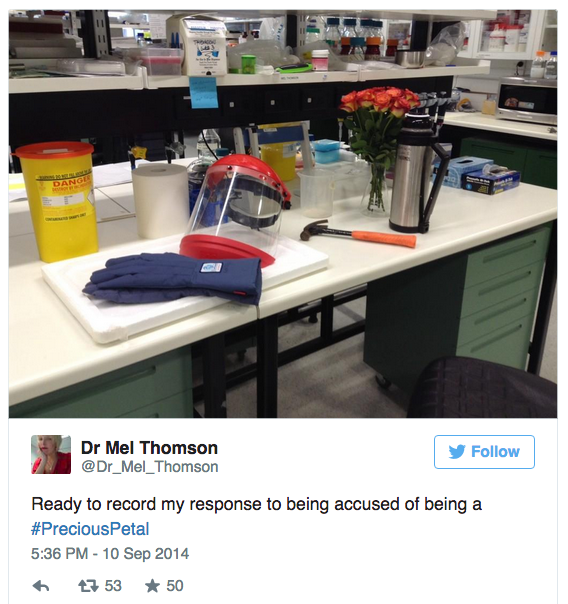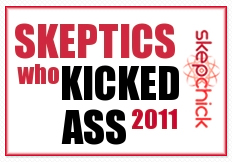There’s been plenty of talk about science communication of late, specifically who should do it and should they be rewarded for their efforts.
The discussion started when two opposing view points were posed regarding metrics – one suggesting science communication (or #scicomm to the cool kids) should be considered in official metrics for academics and one strongly disagreeing.
(There were also some other discussions surrounding those who are already in a position of privilege dismissing the importance of #scicomm, and these played out on Twitter).
The perpetual argument for scientists not doing #scicomm could be distilled to “forcing scientists to do #scicomm distracts them from research and risks attracting sub-standard researchers to the field”. I disagree with this assessment, as you’ll see a bit later.
Nevertheless, this is an important discussion because in the world of academic science, careers are won and lost on “publish or perish”. Grants and promotions are rewarded based on “metrics” – which essentially constitutes how many papers you’ve published, how important the journals in which you publish are, and where in the author list your name falls.
This was once the only way to gain traction up the academic ladder, but times, they-are-a-changin’, and this includes coming out from behind the paywall of scientific publishing to talk about your work.

Discoveries Needs Dollars was a hugely successful grass roots campaign, instigated
by scientists at the WEHI. Photo credit Dr Francis Geronimo
One of the reasons why I think we should be doing #scicomm is because, not unlike other vocations such as law or medicine, science operates in another language, one that is foreign to a reasonable person. Its publications are complex, convoluted and verging on impenetrable, not only because they are frequently paywalled, but they’re written in jargon and use obscure acronyms.
Evidence suggests that even other researches don’t read their peer’s work, and even when papers are cited – meaning they are referenced in other scientists’ publications – it has been shown that they have not necessarily been completely read. Likely the abstract has been, but not the rest of the paper, and abstracts often misrepresent the findings in the body of the paper.
So here we have a situation where a) no one, sometimes not even other scientists, understand what scientists are jabbering on about b) even if you dared attempt to decipher a scientific publication you have to pay a large publishing company to read it and c) even other scientists CBF reading their colleagues work.
In my opinion, this is a problem for several reasons.
1) If scientists are receiving public funds to do research, then we should be required to tell people what we have done with their cash. Beavering away in a basement lab and pleading “mad scientist” is not acceptable and only serves to perpetuate myths about scientists.
2 – and this is particularly important – we cannot expect support from the public if we don’t engage with them.
Consider this with respect to funding. As far as the government is concerned, scientists as a group are low hanging fruit. We are not strongly union represented, we are not vocal, and the public does not universally love us. You don’t see people marching on the streets in our defence when the government cuts millions from the CSIRO budget. Consider that the current government did not even appoint a science minister when they came into power, only acquiescing after pressure from the scientific community and a cabinet reshuffle over 12 months later.

Dr Mel Thomson reacted to being called a “precious petal” as any good scientist would – with liquid nitrogen and a hammer!
Indeed, when we do complain about job losses and budget cuts we’re called “precious petals“.
By contrast, recall the outcry when the government discontinued funding to the automotive industry in Australia? Eventually they offered assistance packages in the form of retraining for retrenched workers, – not so for scientists who lose their jobs as every grant season comes around or when the CSIRO has $110 million cut from its budget.
Who could forget the story of the scientist tipped to win a Nobel prizer who lost his job from CSIRO so opted to work for free. I’d like to see some politicians do this…
But there have been times when public support for science has been high and the results have been very positive. Remember Discoveries Needs Dollars, a grassroots campaign designed to protest slated cuts the science budget leading up to the 2011 election?
This was instigated by researchers at the WEHI and mobilised thousands of scientists from across the country to take to the streets in lab coasts and placards in an effort to convince the government not to cut research funding.
What made this campaign so compelling was stream of people who stepped up to talk about how they’d been helped by science based medicine. It was personal – people could relate to it, it resonated with the public who saw no sense in cutting research funding when the return on investment is so high. And it was successful, the budget cuts were reversed.
This was a great case study for the power of #scicomm but that was 2011 and has the momentum continued? No.
As is their right and responsibility, (most) scientists returned to their benches and forgot all about it. But they shouldn’t and here’s why.
If we don’t talk about science, participate in discussions in the media, write blogs and articles, translate the complex into the simple, then other people will. People who do not understand science, or whose only intent is to deliberately distort science for their own gain. People like Pete Evans, Bell Gibson, Jessica Ainscough, Mike Adams, Dr Mercola, Dr Oz, the list goes on. And compared to the number of people doing a poor job of representing science, there are only a handful sticking up for it.
This is our fault and our responsibility. And as academic scientists, we should be rewarded for it. I don’t have the answer for how to best design metrics for measuring #scicomm output but I absolutely think they should be, and I’m glad this discussion is taking place. Because if we don’t stick up for science, then who will?
Post script: Follow up reading material on measuring #scicomm output can be found on Dr Cameron Webb’s blog “Putting a Value on Science Communication“. Follow Dr Cameron and Dr Mel Thomson on Twitter





